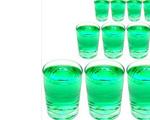 Alcoholism can be a deadly disease. In this article we explore some effects that alcohol can have on the body's organs.
Alcoholism can be a deadly disease. In this article we explore some effects that alcohol can have on the body's organs.
ACTION OF ALCOHOL ON THE STOMACH
The action of alcoholic beverages on the stomach is so extremely risky that it becomes unable to bring forth the natural digestive liquid in sufficient aggregate and also fails to absorb the food which it may imperfectly digest. An affliction marked by the sense of nausea emptiness, prostration and distention will always be faced by an alcoholic. This results in a loathing for foodstuff and is teased with a craving for more booze. Thus there is engendered a nonterminating disorder which is called dyspepsia. The disastrous forms of confirmed indigestion originate by this practice.
THE LIVER
The anatomic deteriorations caused by the constant use of alcoholic beverages are often of a fatal character. The organ which most frequently undergoes structural changes from alcoholic beverages is the liver. Most often, the liver has the capacity to hold active substances in its cellular parts. In cases of poisoning by diverse poisonous compounds, we analyse liver as if it were the central depot of the foreign matter. It is practically the same in respect to alcoholic beverages. The liver of an alcoholic is never free from the influence of liquor and it is too often saturated with it. The minute membranous or capsular composition of the liver gets affected, preventing proper dialysis and free secretion. The liver becomes large due to the dilatation of its vessels, the surcharge of fluid matter and the thickening of tissue. This follows contraction of membrane and shrinking of the whole organ in its cellular parts. Then the lower parts of the liquoric becomes dropsical owing to the obstruction offered to the returning blood by the veins. The characterization of the liver may be charged with fatty cells and undergo what is technically designated 'fatty liver'.
EFFECT ON KIDNEYS
The Kidneys also feel the pangs due to the excessive consumption of liquor. The vessels of idneys lose flexibility and power of attenuation. The minute structures in them go through fatty modification. Albumin from the blood decidedly passes through their membranes. This results in the body losing its power as if it were being run out of blood gradually.
LUNG CONGESTION
Alcoholic beverages relaxes the vessels of the lungs easily as they are most exposed to the fluctuations of heat and cold. When subjected to the effects of a rapid variation in atmospheric temperature, they get readily congested. During severe winter seasons, the suddenly fatal congestions of lungs clearly affects an liquoric.
ALCOHOL AND THE HEART
Consumption of alcoholic beverages greatly affects the heart. The quality of the membraneous characterizations which cover and line the heart differences and are thickened, become cartilaginous or calcareous. Then the valves lose their suppleness and what is termed valvular disorder becomes continual. The structure of the the coats of the great blood-vessel leading from the heart share in the same differences of composition so that the vessel loses its elasticity and its power to feed the heart by the recoil from its distention, after the heart, by its stroke, has filled it with blood.
Again, the muscular arrangement of the heart fails owing to degenerative differences in its tissue. The elements of the muscular fibre are replaced by fatty cells or, if not so replaced, are themselves transferred into a modified muscular texture in which the power of constriction is greatly reduced.
Those who feel the pangs from these anatomic deteriorations of the central and governing organ of the circulation of the blood learn the fact so insidiously, it hardly breaks upon them until the mischief is far advanced. They are conscious of a central failure of power from slight causes such as overexertion, trouble, broken rest or too long abstinence from nourishment. They feel what they call a 'sinking' but they know that wine or some other stimulant will at once relieve the sensation. Thus they seek to relieve it until at last they discover that the remedy fails. The jaded, overworked, active heart will bear no more. it has run its course and the governor of the blood-streams broken. The current either overflows into the tissues gradually damming up the courses or under some slight shock or excess of motion ceases wholly at the center.
Short note about the author
Author: Yvonne Volante
